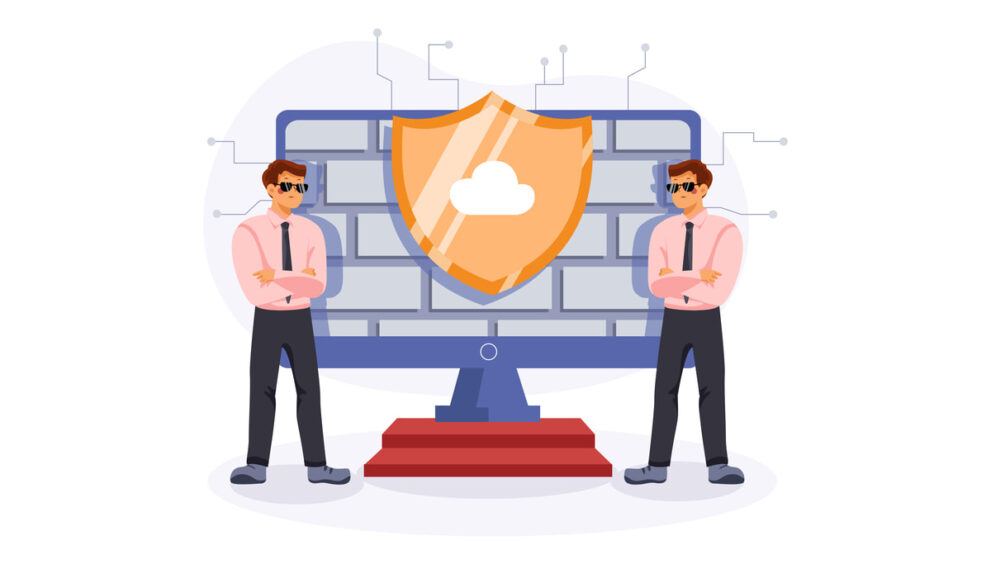Important Firewall Advice for Better Online Security

Online security is becoming increasingly important as the world moves online. A firewall is one of the most crucial instruments for guaranteeing the safety and security of your online activities.
Here are some crucial firewall pointers to help you safeguard your internet activity:
- Use a firewall: A firewall is one of the most important security tools for defending your computer from outside attacks. You can safeguard your computer from viruses, hackers, and other internet risks by properly configuring your firewall.
- Maintain your firewall: Maintaining it will help ensure it can adequately defend your computer from new threats. Please take advantage of the automatic upgrades that many firewall systems offer by using them.
- Appropriate configure your firewall: You must appropriately configure your firewall to safeguard your computer. The documentation for your firewall should provide information on how to do this.
- Use a reputable antivirus product: You should use an antivirus application and a firewall to safeguard your computer from malware and other online threats.
- Maintain your antivirus program’s updates: Like your firewall, your antivirus application needs to be kept current to defend your computer from new threats effectively.
- Exercise caution while opening email attachments: Email attachments are one of the most popular methods for spreading malware. Even if the email is from someone you know, exercise caution when opening attachments.
- Exercise caution when downloading files from the Internet: Downloading malicious software via the Internet is another typical way for malware to spread. Even if they come from a reputable source, you should still proceed with caution while downloading files from the Internet.
- Keep your operating system and software up to date: Updating your system and software is one of the best ways to safeguard your computer from security risks. You may aid in preventing viruses and hackers from being able to exploit security flaws by keeping your software up to date.
Expert Advice to Protect Your Digital Assets
It’s critical to preserve digital assets with professional guidance. You can take further steps to ensure your data’s security and use firewalls to protect your assets.
Here are some pointers to safeguard your digital assets:
- Make use of secure passwords and avoid reusing them.
- Whenever practical, enable two-factor authentication.
- Maintain software updates.
- Use a trustworthy security program.
- Regularly back up your data.
- Use caution when downloading and clicking on links.
- Recognize social engineering scams.
- When using a VPN, do so.
- Whenever possible, stay away from public Wi-Fi.
- Be on the lookout for shady behavior.
You can prevent the compromise of your digital assets by keeping in mind these suggestions. Contact an experienced IT security specialist if you have any additional inquiries.
Advantages of a Firewall
A firewall is a network security system that monitors and regulates incoming and outgoing network traffic by pre-established security rules. Typically, a firewall creates a wall between a trusted internal network and an unreliable external network, like the Internet.
Hardware-based, software-based, or a hybrid of the two are all possible for firewalls. Dedicated appliances that reside between the network and the Internet connection are often where hardware-based firewalls are implemented. On individual servers, software-based firewalls are typically implemented.
The following are the top three advantages of employing a firewall:
- Sensitive data protection
- Defense against harmful assaults
- Controlling network traffic
1. Sensitive data protection
A firewall’s ability to prevent unwanted access to sensitive data is one of its most crucial functions. Depending on how sensitive the data is, firewalls can be set up to allow or restrict a certain type of traffic. To prevent untrusted parties from intercepting and reading data in transit, a firewall, for instance, can be set up only to let encrypted communication pass through.
2. Defense against harmful assaults
Another crucial function is a firewall’s ability to stop hostile attacks from jeopardizing a network’s security. Both traffic from known malicious sources and suspicious traffic can be blocked by firewall configuration. By doing this, firewalls can aid in preventing the installation of malware on computers connected to a network and the theft of private information.
3. Controlling network traffic
Firewalls can be used to control the flow of traffic into and out of a network, safeguarding data and stopping assaults. Denial of service assaults, a class of attack that overloads a network by flooding it with traffic, is one example of how this might be helpful. Additionally, bandwidth usage for particular types of traffic, such as peer-to-peer file sharing or streaming video, can be restricted using firewalls.

How to Choose the Correct Firewall Depending on Your Needs
It would help if you made a few considerations while selecting a firewall for your company.
Here are four suggestions to assist you in choosing the best firewall for your requirements:
1. Identify Your Needs
Finding out what you need is the first step. What are you attempting to safeguard? What dangers might you face? Looking at various firewall alternatives is something you can do once you have a solid idea of your requirements.
2. Think About Your Budget
Budget is always a crucial factor to consider when purchasing for your company. Spend some time investigating various firewall alternatives and comparing costs. Remember to account for expenses like installation and upkeep.
3. Review Features
When you’ve narrowed your choices down, it’s time to compare characteristics. What qualities matter to you? Do you require anything simple to operate? Do you require sophisticated tools like intrusion detection? Make sure the firewall you select offers the functionality you require.
4. Obtain Referrals
Last, remember to ask for suggestions from people familiar with firewalls. Obtain advice from your IT provider or specialist. They might have some excellent ideas that you have yet to think of.
By following these four recommendations, choose the ideal firewall for your company’s needs.
Setting Up Your Firewall to Provide the Best Protection
A few considerations should be made while configuring your firewall for maximum security.
Here are five ideas to get you going:
1. Understand your foe
Understanding what or from whom you are trying to protect yourself is the first step in configuring your firewall. Do you fear cybercriminals? Are malware concerns on your mind? Or are you merely attempting to keep out intruders? You may start configuring your firewall following your needs after knowing who or what you are trying to protect yourself against.
2. Control Inbound
Traffic Controlling inbound traffic is one of the most crucial things you can do to safeguard your computer. As a result, you should only permit inbound traffic from reliable sources. Any additional traffic should be immediately stopped.
3. Permit Outside Traffic Locking down
Inbound traffic is crucial, but you must also let outward traffic pass. Some computer programs require communication with the outside world to operate effectively.
4. Maintain an up-to-date firewall
Ensuring your firewall is always up to date is crucial additional advice. Your firewall must be able to shield you from the new dangers that are continually developing.
5. Keep Track of Traffic
Finally, to ensure that your firewall is operating effectively, you should constantly monitor your traffic. You may accomplish this with various tools, so use them frequently.
You may assist in safeguarding your computer from the various risks that are there on the Internet by keeping in mind these suggestions.

Guidelines for Keeping Firewall Security
The Internet has integrated into our daily life. We utilize it for communication, fun, and work. It has permeated every aspect of our lives to the point where it is difficult to fathom life without it.
Unfortunately, there are risks when using the Internet. Some wish to take our identities, financial resources, and private information. They accomplish this by developing dangerous software that can infect our computers and other electronic devices, such as viruses and malware.
It is crucial to establish a firewall because of this. Our computers and other devices can benefit from a firewall’s protection against these attacks.
Following are six recommendations for keeping firewall security:
1. Always update your firewall
Make sure your firewall is installed with the most recent version. Firewalls are regularly updated to ensure they are equipped to handle the latest threats.
2. Correctly configure your firewall
For your firewall to function successfully, it must be properly configured. Ensure it is configured to block the traffic types that are most likely malicious.
3. Install a firewall on each device.
A firewall should be enabled on all your devices, not just your computer. A firewall is frequently incorporated into routers, but you should turn it on.
4. Utilize a VPN.
Your internet traffic is encrypted by a VPN (virtual private network), making it more difficult for hackers to eavesdrop. If you utilize public Wi-Fi, this is very crucial.
5. Recognize phishing frauds.
Phishing schemes aim to fool you into disclosing sensitive data like passwords or credit card numbers. When clicking on emails or links, exercise extreme caution.
6. Maintain software updates
Hackers frequently use software security flaws to infect computers and other electronic devices. Maintaining all of your software up to date, including your web browser, operating system, and any plugins or add-ons, is crucial.
Problem-Solving for Firewalls
There are a few things you can attempt to troubleshoot if your firewall is giving you issues.
These are seven tips for troubleshooting:
- Look at the firewall logs. The fact that they can provide you with hints as to what is happening makes this a smart place to start.
- Verify the firewall rules that are in place. Verify that they are accurate and are not preventing anything from happening that ought to be permitted.
- Start the firewall again. It can occasionally resolve problems.
- Verify the firewall software for updates. Install them if there are any, then check if the issue is resolved.
- Verify the firewall’s setup. Make sure the configuration is accurate.
- Temporarily turn off the firewall to see if it solves the issue. If it occurs, you can be sure the firewall is to blame for the problem.
- If you’re still having issues, seek assistance from a licensed technician or the firewall manufacturer.






